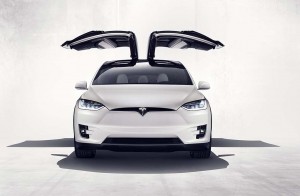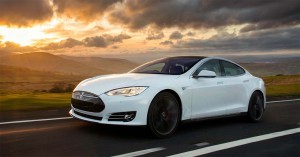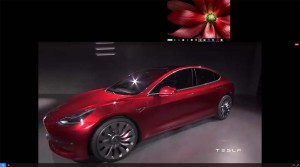Already facing growing concerns about quality issues with its newest electric vehicle, the Model X SUV, Tesla Motors was hammered by influential Consumer Reports magazine this week, the non-profit publication ranking the California carmaker 25th of 29 brands in its annual automotive reliability study.
It wasn’t all bad news. After faring poorly in the 2015 auto survey, CR said the Tesla Model S actually had “improved reliability.” But the newer Model X “has a long way to go,” with a variety of issues including balky falcon wing doors, locks, latches and other systems.
The Model X is “the sixth least reliable vehicle in our survey, and there are some monumental challenges with that vehicle,” Jake Fisher, Consumer Reports’ director of automotive testing, said during an appearance before the Detroit Automotive Press Association. “It’s unclear,” he added, “whether they will get the ‘falcon wing’ doors right ever.”
That harsh note comes in sharp contrast to the tone Consumer Reports took little more than a year ago. In August 2015, it announced that the Model S had effectively broken the magazine’s testing system, scoring 103 out of a possible 100. But just two months later, the battery sedan was the object of derision, running up so many problems, according to the annual reader survey, that it was no longer given a coveted “Recommended Buy” rating and nearly landed on the don’t-buy list.
But things only got worse with the launch of the Model X. The SUV came to market about two years late, Tesla struggling to deal with a variety of problems. It was forced to almost completely redesign the falcon doors, for example. Designed to open upwards to make it easy to enter the vehicle, the system has proven difficult to manage, more than occasionally failing to open, especially if a Model X isn’t parked on a level surface, causing some flex to its body.
(Buick lands in top 3 in latest Consumer Reports reliability study. Click Here for more.)
The maker has been struggling to counter the growing perception of poor quality, founder and CEO Elon Musk earlier this year declaring that his goal is to build “the world’s most reliable cars,” even if that means curbing production.
In fact, quality issues did result in a production shortfall during the first half of 2016, though the pace at the Tesla plant in Fremont, California has improved in recent months. That shows the company is getting things under control, according to a Tesla spokesperson.
“The amount of issues we’ve addressed with Model X has fallen by 92% in the last 12 months, a reflection of our ability to make continuous improvements and react quickly,” the automaker stated.
Whether those promised improvements will show up in next year’s reliability study remains to be seen. For now, Tesla ranks only slightly above four Fiat Chrysler Automobiles brands that have traditionally anchored the industry’s reliability charts.
(Honda Clarity hydrogen car to get 366 miles per tank. Click Here for the latest.)
But all is not entirely gloomy. Tesla continues to do better in terms of customer satisfaction, and the brand was ranked number one in the Ideal Vehicle Awards presented by consulting firm AutoPacific, Inc., over the summer.
“Tesla is hitting the mark in areas that tend to be problem areas for most manufacturers: technology, power and acceleration and safety features,” said George Peterson, the consultancy’s top analyst.
There is often a distinct gap between quality and customer satisfaction, especially for niche brands and exotic products, such as high-performance sports cars. And Tesla has developed a large fan club among those who believe it is leading the industry in terms of green technologies.
But Peterson and other analysts have warned that Tesla’s reliability issues could come back to bite the brand in the future, especially as it goes after a more mainstream audience less forgiving of problems that could take a vehicle off the road.
The real test will come when the Tesla Model 3 makes its way into showrooms sometime during the second half of 2013.
“It is mission critical” that Tesla address its quality problems before that smaller battery car, targeting a more mainstream market, hits showrooms, said Erich Joachimsthaler, founder and CEO of Vivaldi, a brand research and consulting firm.
Tesla, he said, has an almost Teflon-like image, its “fanboys” willing to accept problems that eventually get fixed. But that level of tolerance will drop sharply, Joachimsthaler believes, with the Model 3. Buyers will be less likely to have other cars in the household fleet and will be impacted more directly if the battery sedan were taken out of service.
Meanwhile, other manufacturers are getting into the battery-car game, including General Motors with the mainstream Chevrolet Bolt set to come out months ahead of the Model 3.
For Tesla, the good news is that the Model S has shown significant signs of improvement and is now back on the Consumer Reports list of vehicles with average quality. The question is whether the California carmaker can not only launch the Model 3 on time but also without the initial problems that plagued earlier Tesla product lines.
(Fisker ready to launch new electric vehicle company, could see range of over 400 miles. Click Here for the latest.)



